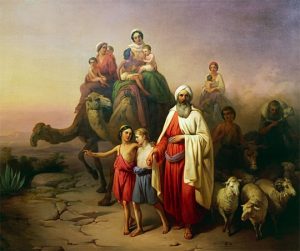
Joseph the Dreamer
As we approach the concluding chapters of Genesis, we are guided along by Moses to the remarkable saga of Joseph. Both the struggle and the exciting redemptive work of God in Joseph’s life leads the observer to anticipate what our great God was to accomplish for His chosen peo![]() ple. The early history of the Jew, from Abraham’s arrival in Canaan and God’s covenant with him (c.2000BC) to Joseph’s bringing his family to Egypt (c.1876BC) certainly contains a full share of man’s human struggle even when bearing the mark of God. For 250 years, Abraham’s clan were nomads in Canaan as they went through phases of worship of Jehovah and rebellion. After Joseph, the Jews will sojourn in Goshen as slaves for another 250 years before He raises up another deliverer in Moses. Remember that God told Abraham that there would come a time that his descendants would be slaves in Egypt (Gen. 15:13; Exo. 12:40-41; Acts 7:6; Gal. 3:16-17). It is interesting to note that Abraham’s first sojourn to Egypt (Gen. 12), which occurred 430 years before the Exodus (c.1445BC), was conceivably the beginning of an increasing subjugation to Egypt. That first debacle in Egypt initiated a downward spiral that led to Israel’s slavery in Egypt after Joseph.
ple. The early history of the Jew, from Abraham’s arrival in Canaan and God’s covenant with him (c.2000BC) to Joseph’s bringing his family to Egypt (c.1876BC) certainly contains a full share of man’s human struggle even when bearing the mark of God. For 250 years, Abraham’s clan were nomads in Canaan as they went through phases of worship of Jehovah and rebellion. After Joseph, the Jews will sojourn in Goshen as slaves for another 250 years before He raises up another deliverer in Moses. Remember that God told Abraham that there would come a time that his descendants would be slaves in Egypt (Gen. 15:13; Exo. 12:40-41; Acts 7:6; Gal. 3:16-17). It is interesting to note that Abraham’s first sojourn to Egypt (Gen. 12), which occurred 430 years before the Exodus (c.1445BC), was conceivably the beginning of an increasing subjugation to Egypt. That first debacle in Egypt initiated a downward spiral that led to Israel’s slavery in Egypt after Joseph.
The backbone of Genesis is Abraham, Isaac and Jacob – the patriarchs of the Jewish faith. In the sweeping scenarios of Genesis 12-50, we have seen these three men provide the foundational experiences of mankind acting upon the revelations from God about faith and righteousness. Before Abraham in Genesis 12, the world was embroiled in the aftermath of the Fall. When Adam and Eve were expelled from the Garden because of their sin, they certainly had convincing guilt for their sin, but were they saved? We understand that Abel’s sacrifice was given in faith, and since Heb. 11:6 includes him in the Hall of Faith, he did have saving faith. Just importantly, this sacrifice continued the depiction begun with Adam and Eve of shed blood being related to God’s path to forgiveness of sin. Fundamentally, some chose towards God and others chose away from Him. This understanding of faith, response and sacrifice continued as mankind proceeded to multiply as God had commanded, just as the tragedy of Adam’s seed and his sin nature being multiplied through every human being.
We have followed the major epochs of time which Moses writes about in Genesis, noting the Hebrew word “toledoth” (see the Hebrew word Moses used on right)  which he used by God’s inspiration to emphasize the progression of the generations of man in Genesis 2:4, 5:1, 6:9, 11:10, 25:19 and 37:2. After the tumultuous generations of sinful humanity led to the Flood, God raised up Abraham as the “father of faith”. This was based on the great principle in Gen. 15:6 that God “reckoned” or unilaterally declared Abraham to be righteous based on his faith in God and His provision of redemption. With Abraham, God initiated His gracious work among sinful mankind to have a “chosen people” who were uniquely blessed by God to be the channel through which the Redeemer promised in Gen. 3:15 would finally come. In Genesis, Moses has shown how Abraham and his descendants, all imperfect and sinful people, were blessed by God to receive revelation of Who He is and how He relates to man, often in spite of the shortcomings even of the patriarchs themselves.
which he used by God’s inspiration to emphasize the progression of the generations of man in Genesis 2:4, 5:1, 6:9, 11:10, 25:19 and 37:2. After the tumultuous generations of sinful humanity led to the Flood, God raised up Abraham as the “father of faith”. This was based on the great principle in Gen. 15:6 that God “reckoned” or unilaterally declared Abraham to be righteous based on his faith in God and His provision of redemption. With Abraham, God initiated His gracious work among sinful mankind to have a “chosen people” who were uniquely blessed by God to be the channel through which the Redeemer promised in Gen. 3:15 would finally come. In Genesis, Moses has shown how Abraham and his descendants, all imperfect and sinful people, were blessed by God to receive revelation of Who He is and how He relates to man, often in spite of the shortcomings even of the patriarchs themselves.
In Gen. 25:19, Moses emphasizes the beginning of a new major epoch (“toledoth”) in the people of Israel with the birth of Jacob. Then beginning in Genesis 37 (the tenth and final mention of “toledoth” in Genesis in 37:2), Moses brings us to the life of Joseph, the Great Deliverer of his people – actually the first deliver, followed by Moses and then Jesus Christ. While not spoken of as one of “Three Patriarchs”, Joseph looms large in God’s work for His people Israel. Again, note the large portion of work Moses put into Joseph, a saga filled with family struggle, intrigue, and drama, but especially characterized by God’s grace at every turn. These 14 chapters are designed by God to provide the backdrop for the story of His rescue of His people hundreds of years later, as well as the rescue of the world from sin through Jesus Christ the Redeemer. These chapters are a rich expression of God’s grace in the midst of tremendous struggle.
Please pause here and open your Bible and read through Genesis 37-38 in one sitting before you continue on through this Bible Study.

Gen. 37-39, Joseph’s Background and Early Life
While the birth of Jacob’s children are of major importance,![]() being the heads of the twelve tribes of Israel, yet we need to note that they were born in the midst of rivalry, a family life which impacted how they handled many issues in their lives – most notably, their young brother Joseph. Leah struggled with being unloved by Jacob, but God blessed her with four sons. Rachel was barren, Jacob provided her two concubines to accomplish his progeny. Their culture placed great pressure on women to bear children,
being the heads of the twelve tribes of Israel, yet we need to note that they were born in the midst of rivalry, a family life which impacted how they handled many issues in their lives – most notably, their young brother Joseph. Leah struggled with being unloved by Jacob, but God blessed her with four sons. Rachel was barren, Jacob provided her two concubines to accomplish his progeny. Their culture placed great pressure on women to bear children,  particularly men, because they were essential for their ongoing family’s survival. Joseph was the eleventh son of Jacob, born to Rachel when God finally blessed her with having a child (Gen. 30:22-24). Her last son, Benjamin, Jacob’s twelfth, was born at her death (Gen. 35:18). Appropriately enough, the name she gave him, Ben-oni, interprets to mean “son of my pain”, understanding the struggles she had faced. Jacob adjusted the name to Benjamin which meant “son of my right hand”, a place of honor. Note that these births occurred during the last few years of Jacob’s servitude to Laban and his large family’s travel back to Canaan.
particularly men, because they were essential for their ongoing family’s survival. Joseph was the eleventh son of Jacob, born to Rachel when God finally blessed her with having a child (Gen. 30:22-24). Her last son, Benjamin, Jacob’s twelfth, was born at her death (Gen. 35:18). Appropriately enough, the name she gave him, Ben-oni, interprets to mean “son of my pain”, understanding the struggles she had faced. Jacob adjusted the name to Benjamin which meant “son of my right hand”, a place of honor. Note that these births occurred during the last few years of Jacob’s servitude to Laban and his large family’s travel back to Canaan.
Jacob’s Special Love for Joseph, Gen. 37:3-11 — As Joseph grew older, Gen. 37:3-4 reports that Israel (as God had renamed Jacob) expressed special affection for his youngest son Joseph and gave him a remarkable colored robe, stirring up layers of hatred in his older brothers. Keep in mind that, because of His longsuffering love for His people and their need of a Redeemer, our sovereign God had allowed these events to occur. He also revealed the dreams to Joseph (37:5-10) which he happily described to his brothers, adding to their hatred. Note that their weak father Jacob did nothing.
The Brothers Conspire, Gen. 37:12-17 — The brothers take their father’s flock on a grazing trip out towards Shechem, and then Jacob unwisely sends young Joseph out to check on the brothers and bring food. The whole family was aware of the bad relationships yet Jacob sent him anyway. Jacob owned property in Shechem so the men went in that direction. Remember that in Gen. 34, Jacob’s daughter Dinah was defiled by Shechem, which resulted in a horrible slaughter of Shechem’s men by Simeon and Levi. This became a heritage of violence and selfish excess, carried on by Joseph’s brothers. To send Joseph into this hornet’s nest of raw fallen humanity was a great failure of Jacob.
God providentially sent a stranger to redirect Joseph from wandering in the field to go in the right direction of Dothan towards his brothers. It is sad to think of Joseph coming around the bend to see his brothers around a campfire, how he would have been glad to see them and bring them food. He would have no idea of the harmful scheme the others were conspiring against him, as they scornfully declared “here comes the Dreamer”. They were bent on being rid of Joseph’s privileged place in the family. Humanly, we would wonder why God’s providence would guide Joseph to the location adjacent to the trading route where his captors would take him to Egypt, the dry cistern, and the slow moving caravan arriving at just the right moment. It is good that we are able to look at the craftmanship of God’s plan, for Joseph and for each of us as well, from a higher perspective than any one event.
Oldest brother Reuben heard the harmful plans being suggested and tried to intervene (Gen. 37:21) and tried to calm their jealousy to avoid outright murder (which we know they are capable of from Gen. 34) and suggested the pit as the lesser evil option. It is remarkable to think of the brothers sitting there listening to Joseph begging to be rescued. Likely, the sale to the traders became an afterthought with the additional benefit of financial profit (Gen. 37:26-27). Reuben had left for a while and when he returned he was horrified the pit empty (37:29). He had failed his first-born responsibility of looking after his father’s interests and would be held accountable. He was forced to go along with the scheme to make it look like an animal had killed Joseph. Look at the expression of his grief over this incident when he recounts it in Gen. 42:22.
An Ugly Backstory, Gen. 38 — Before proceeding with what happens to Joseph, Moses reports another tragic incident involving another of Jacob’s sons. Judah, who had the potential of becoming a leader of the Jacob’s clan considering the previous moral failure of Reuben, Simeon and Levi. He would ultimately be declared by God as bearing forward the seed of the Messiah (Gen. 49:8-10). “At that time…”, (38:1), places these events right at the same time as Joseph’s being taken to Egypt, although we can’t set a specific point in that period. It is about 22 years prior to Jacob’s family being rescued by Joseph, so this episode is a sad period of transition to that great event. Judah’s moral failure will serve later as a stark contrast to the godly character of Joseph. Judah marries a Canaanite, has three wicked sons who are judged by death by God. Judah’s life became the plot for a bad movie as he falls victim to the deception of Tamar his daughter-in-law posing as a prostitute. After sleeping with her, she tricked Judah into revealing himself later as a liar (Gen. 38:18-26). Amazingly, God in His abundant grace blessed her with twins and the older, Perez (Gen. 38:29) was born with the scarlet thread in his hand and according to Ruth 4:18-22, he is in the Messianic line through which David was born. The trail of the unrighteous in the Messiah’s story is a notable expression of God’s grace – Abimelech (Gen. 26:9-11), Tamar here, and Rahab (Josh. 2-6) – each is privileged to be included in the work of God to preserve the Messiah’s line. Judah actually became seen as a central character in the storyline of Moses for Gen. 37-50. Undeserved grace… all who have been saved through Christ have been there!
![]() Bible Study Journal
Bible Study Journal
- How would Jacob, Rachel and Leah individually have influenced Joseph’s early life and development? How does God use that influence in each of our lives?
- Why did God give Joseph early revelations of His plan for him and allow him to announce them to his family?
- How do you see God’s love and sovereignty being displayed in Joseph’s early life up to the time he started serving Potiphar?




